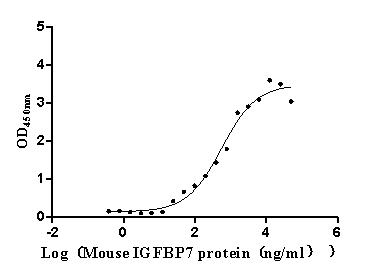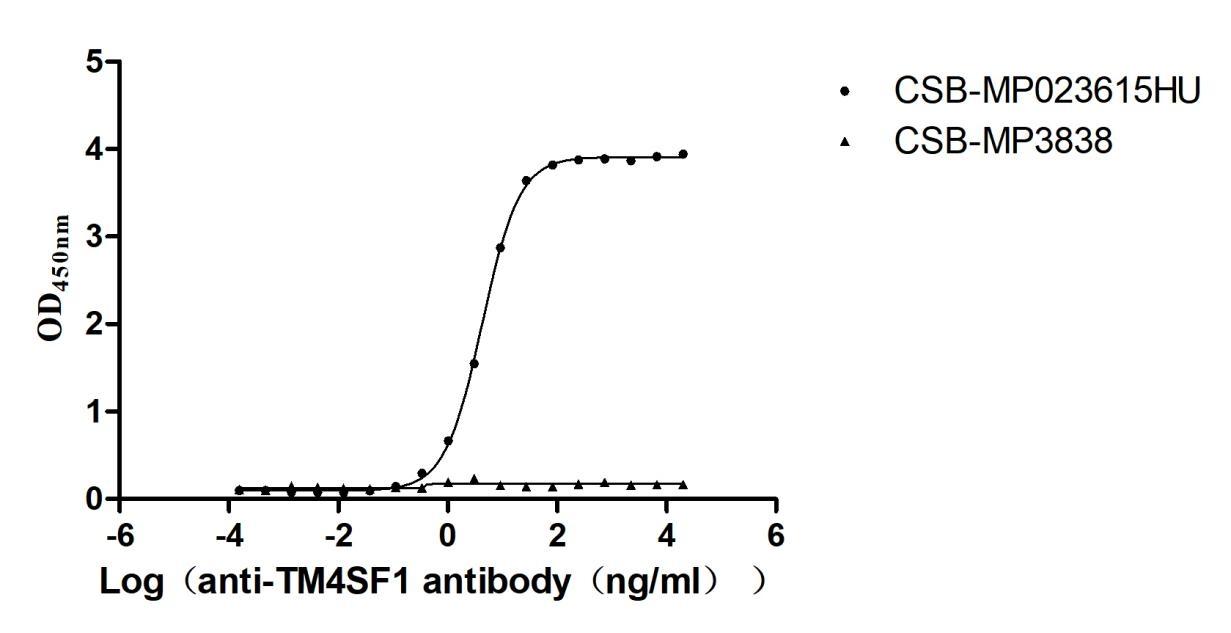Recombinant Mouse Complement component C1q receptor (Cd93), partial (Active)
In Stock-
中文名稱:
-
貨號:CSB-MP004970MO
-
規(guī)格:¥1908
-
圖片:
-
其他:
產(chǎn)品詳情
-
純度:Greater than 95% as determined by SDS-PAGE.
-
內(nèi)毒素:Less than 1.0 EU/ug as determined by LAL method.
-
生物活性:Measured by its binding ability in a functional ELISA. Immobilized Mouse CD93 at 2 μg/mL can bind Mouse IGFBP7 (CSB-MP713980MO), the EC50 is 373.4-836.8 ng/mL.
-
基因名:Cd93
-
Uniprot No.:
-
別名:(C1q/MBL/SPA receptor)(C1qR(p))(C1qRp)(Cell surface antigen AA4)(Complement component 1 q subcomponent receptor 1)(Lymphocyte antigen 68)(Ly-68)(CD antigen CD93)
-
分子結(jié)構(gòu):
-
種屬:Mus musculus (Mouse)
-
蛋白長度:Partial
-
來源:Mammalian cell
-
分子量:60.9 kDa
-
表達(dá)區(qū)域:23-572aa
-
氨基酸序列ADSQAVVCEGTACYTAHWGKLSAAEAQHRCNENGGNLATVKSEEEARHVQQALTQLLKTKAPLEAKMGKFWIGLQREKGNCTYHDLPMRGFSWVGGGEDTAYSNWYKASKSSCIFKRCVSLILDLSLTPHPSHLPKWHESPCGTPEAPGNSIEGFLCKFNFKGMCRPLALGGPGRVTYTTPFQATTSSLEAVPFASVANVACGDEAKSETHYFLCNEKTPGIFHWGSSGPLCVSPKFGCSFNNGGCQQDCFEGGDGSFRCGCRPGFRLLDDLVTCASRNPCSSNPCTGGGMCHSVPLSENYTCRCPSGYQLDSSQVHCVDIDECQDSPCAQDCVNTLGSFHCECWVGYQPSGPKEEACEDVDECAAANSPCAQGCINTDGSFYCSCKEGYIVSGEDSTQCEDIDECSDARGNPCDSLCFNTDGSFRCGCPPGWELAPNGVFCSRGTVFSELPARPPQKEDNDDRKESTMPPTEMPSSPSGSKDVSNRAQTTGLFVQSDIPTASVPLEIEIPSEVSDVWFELGTYLPTTSGHSKPTHEDSVSAHSDTDGQN
-
蛋白標(biāo)簽:C-terminal?10xHis-tagged
-
產(chǎn)品提供形式:Lyophilized powder
Note: We will preferentially ship the format that we have in stock, however, if you have any special requirement for the format, please remark your requirement when placing the order, we will prepare according to your demand. -
緩沖液:Lyophilized from a 0.2 μm filtered 20 mM Tris-HCl, 0.5 M NaCl, 6% Trehalose, pH 8.0
-
復(fù)溶:We recommend that this vial be briefly centrifuged prior to opening to bring the contents to the bottom. Please reconstitute protein in deionized sterile water to a concentration of 0.1-1.0 mg/mL.We recommend to add 5-50% of glycerol (final concentration) and aliquot for long-term storage at -20℃/-80℃. Our default final concentration of glycerol is 50%. Customers could use it as reference.
-
儲存條件:Store at -20°C/-80°C upon receipt, aliquoting is necessary for mutiple use. Avoid repeated freeze-thaw cycles.
-
保質(zhì)期:The shelf life is related to many factors, storage state, buffer ingredients, storage temperature and the stability of the protein itself.
Generally, the shelf life of liquid form is 6 months at -20°C/-80°C. The shelf life of lyophilized form is 12 months at -20°C/-80°C. -
貨期:Basically, we can dispatch the products out in 3-7 working days after receiving your orders. Delivery time may differ from different purchasing way or location, please kindly consult your local distributors for specific delivery time.
-
注意事項:Repeated freezing and thawing is not recommended. Store working aliquots at 4°C for up to one week.
-
產(chǎn)品描述:
This Mouse CD93 recombinant protein was produced in mammalian cell, where the gene sequence encoding Mouse CD93 (23-572aa) was expressed with the C-terminal 10xHis tag. The purity of this CD93 protein was greater than 95% by SDS-PAGE. The activity was validated.
CD93 (C1qRP, AA4.1) is a C-type lectin-like domain (CTLD) protein. The CD93 gene is considered to be derived from the gene duplication of the group XIV member thrombomodulin (TM), so it is classified as the XIV group in transmembrane glycoprotein.
CD93 was originally thought to be a C1q receptor that enhances phagocytosis. Subsequent studies showed that in CD93-null mice, phagocytosis of C1q by macrophages is enhanced despite defective clearance of apoptotic cells in vivo, and thus CD93 is not a receptor for C1q and regulates phagocytosis through an unknown mechanism. The function of CD93 is currently mainly considered to be involved in intercellular adhesion and clearance of apoptotic cells, and is associated with various inflammatory and immune-related diseases, including asthma.
CD93 is a transmembrane receptor that is upregulated in tumor blood vessels in many cancers. Studies have demonstrated that CD93 regulates β1 integrin signaling activation and fibronectin fibrillation during tumor angiogenesis.
A recent study comparing gene expression profiling of tumors under VEGF inhibitor treatment in vivo identified CD93 as a candidate receptor downregulated in VEGF inhibition and a potential target for mediating vascular normalization. This confirms the pro-angiogenic effect of CD93 in endothelial cells. -
Datasheet & COA:Please contact us to get it.
相關(guān)產(chǎn)品
靶點詳情
-
功能:Receptor (or element of a larger receptor complex) for C1q, mannose-binding lectin (MBL2) and pulmonary surfactant protein A (SPA). May mediate the enhancement of phagocytosis in monocytes and macrophages upon interaction with soluble defense collagens. May play a role in intercellular adhesion. Marker for early multipotent hematopoietic precursor cells. May play a role in cell-cell interactions during hematopoietic and vascular development.
-
基因功能參考文獻(xiàn):
- serum CD93 is a biomarker for allergic asthma PMID: 29498549
- The expression of cd93 was observed in pancreatic islets, and leaky vessels were apparent in cd93-deficient pancreases. We further demonstrated that stress-induced release of sCD93 is impaired by hyperglycemia. Study propose CD93 as an important component in glucometabolic regulation. PMID: 27659228
- soluble EGF-like domain containing CD93 protein is a novel angiogenic factor acting on the endothelium PMID: 23272129
- [review] CD93 regulates inflammation as demonstrated in a murine model of cerebral ischemia reperfusion-induced injury and peritonitis; recent data suggests that a soluble form of CD93 regulates the inflammatory function of monocytes/ macrophages. PMID: 22206251
- these data suggest that cell-associated CD93 regulates leukocyte recruitment and complement activation during murine peritonitis. PMID: 21849679
- we speculate that CD93-neuroprotection is mediated via suppression of the neuroinflammatory response through downregulation of CCL21. PMID: 20439917
- Cd93 may be an autoimmune susceptibility gene residing within the Idd13 locus, which plays a role in regulating absolute numbers of CD4(+) NKT cells. PMID: 20387063
- Data demonstrate that inflammation triggers release of sCD93 in vivo, identify the inflammatory macrophage as a source of sCD93, and provide insight into the mechanism by which CD93 contributes to engulfment of apoptotic cells. PMID: 19603257
- Impaired uptake of apoptotic cells in C1qRp-deficient mice indicates that the C1qRp receptor may contribute to the removal of dying cells in vivo. PMID: 15004139
- CD93-deficient mice were unable to maintain antibody secretion and bone-marrow plasma-cell numbers, demonstrating that CD93 is important for the maintenance of plasma cells in bone marrow niches. PMID: 19228948
- These data suggest that AA4.1 is a cell surface marker that can identify the earliest lymphohematopoietic progenitors in mouse development. PMID: 19458045
顯示更多
收起更多
-
亞細(xì)胞定位:Membrane; Single-pass type I membrane protein.
-
組織特異性:Expressed in lung, heart and bone marrow. Expressed at lower level in ovary, whole embryo and fetal liver. Not detected in brain, adult liver or thymus. Highly expressed in peritoneal cavity and bone marrow macrophages. Not detected in epithelial cells.
-
數(shù)據(jù)庫鏈接:
Most popular with customers
-
Recombinant Human Tumor necrosis factor receptor superfamily member 1A (TNFRSF1A), partial (Active)
Express system: Mammalian cell
Species: Homo sapiens (Human)
-
Recombinant Human Neuropilin-1 (NRP1) (Active)
Express system: Mammalian cell
Species: Homo sapiens (Human)
-
Recombinant Human Claudin-6 (CLDN6)-VLPs (Active)
Express system: Mammalian cell
Species: Homo sapiens (Human)
-
Recombinant Human Claudin-6 (CLDN6)-VLPs, Fluorescent (Active)
Express system: Mammalian cell
Species: Homo sapiens (Human)
-
Recombinant Macaca fascicularis lymphocyte antigen 6 family member G6D (LY6G6D) (Active)
Express system: Yeast
Species: Macaca fascicularis (Crab-eating macaque) (Cynomolgus monkey)
-
Recombinant Human Desmoglein-2 (DSG2), partial (Active)
Express system: Mammalian cell
Species: Homo sapiens (Human)
-
Recombinant Human Myosin regulatory light chain 12A (MYL12A) (Active)
Express system: E.coli
Species: Homo sapiens (Human)
-
Recombinant Human Transmembrane 4 L6 family member 1(TM4SF1)-VLPs (Active)
Express system: Mammalian cell
Species: Homo sapiens (Human)







-AC1.jpg)
f4-AC1.jpg)














